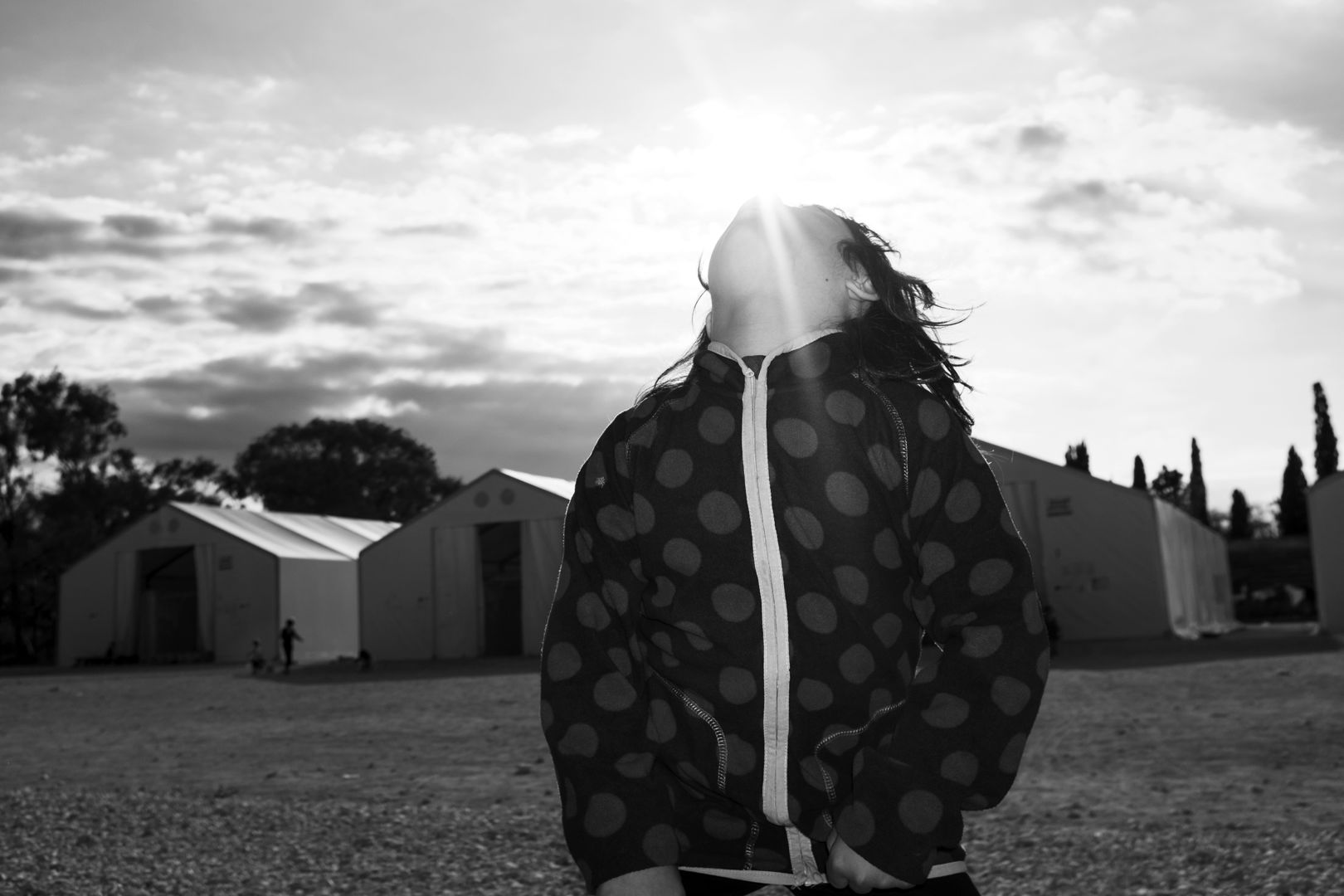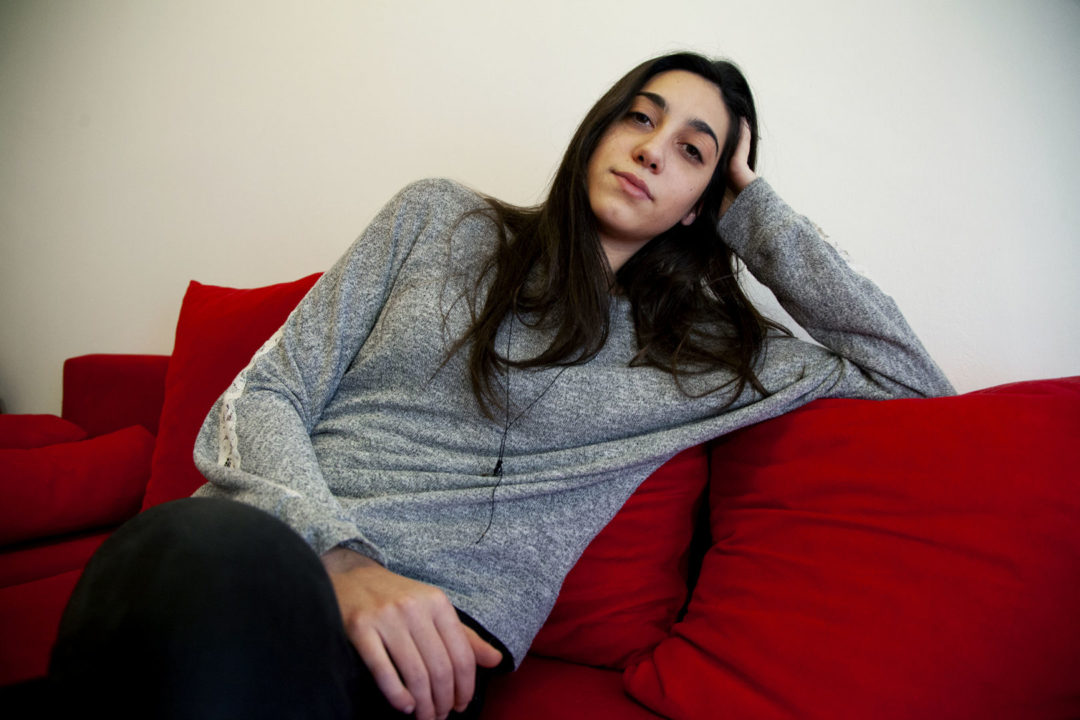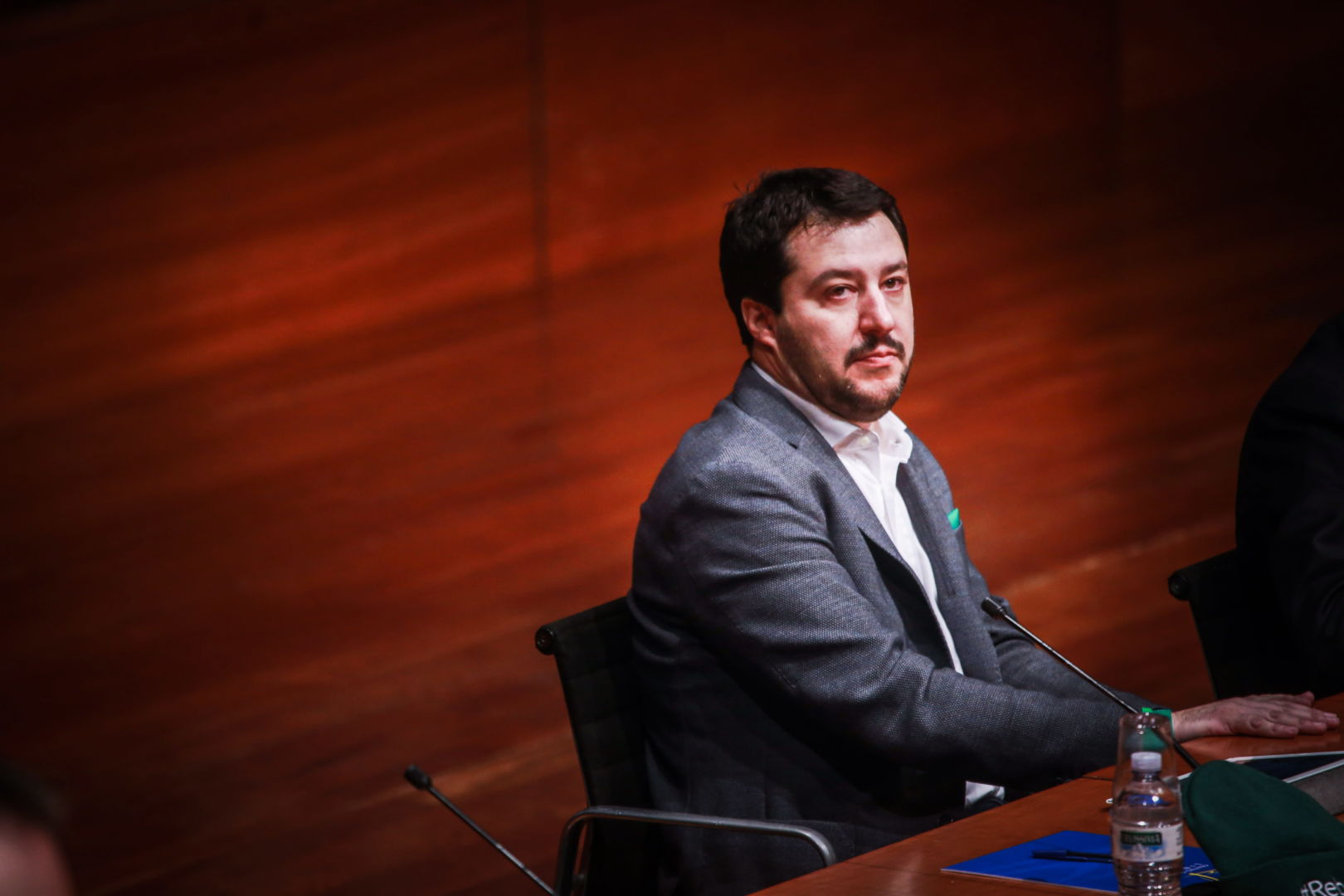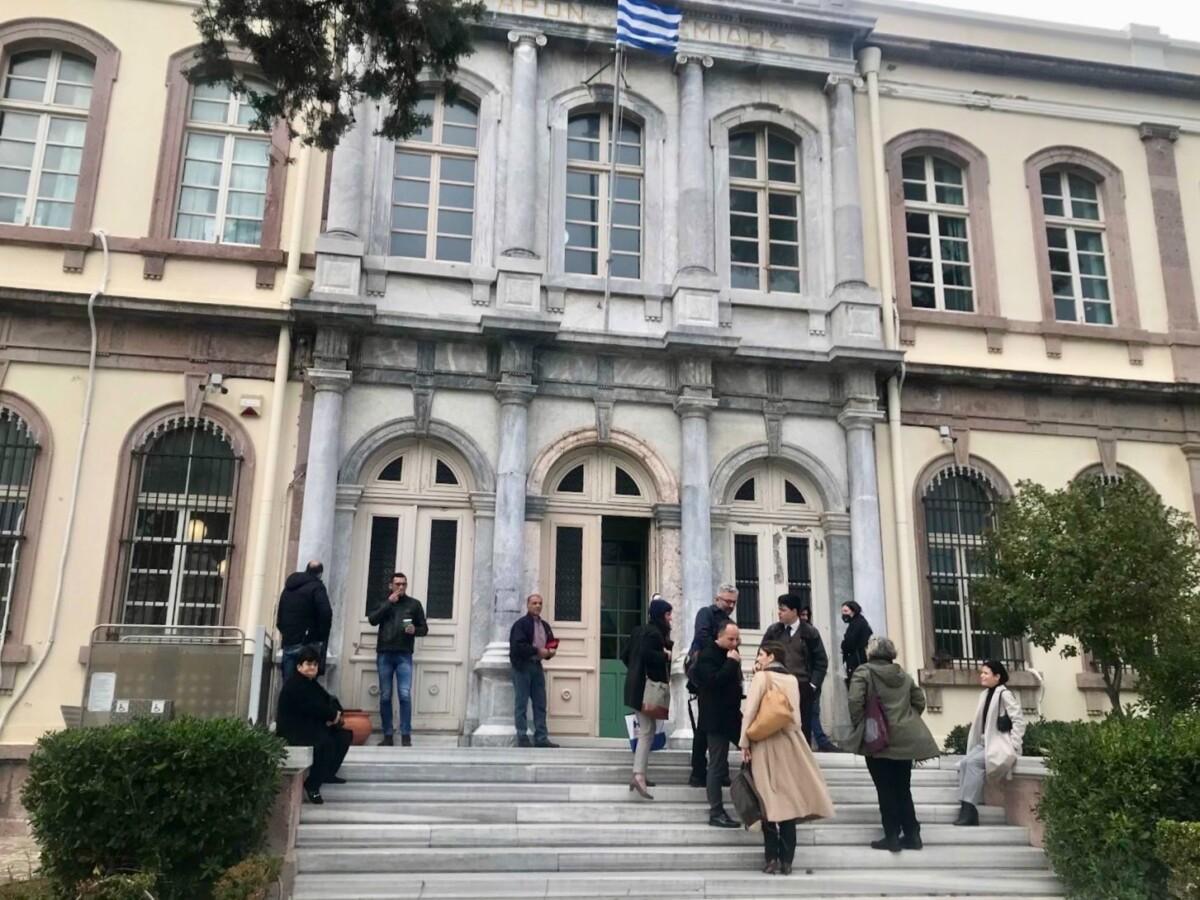Malik Ismail lives in the refugee camp in Corinth. He is 9 ½ years old. He likes playing soccer and playing with his cat, Rousam. He plays in the open fields of the camp and seems content, in the way that children sometimes easily adapt to life’s circumstances.
Malik was born with Down’s Syndrome. Since he arrived in Greece, in 2016, this young Kurdish child from Syria has been “enjoying” his status as a legal refugee, he has not received any health care, nor has he attended a school for children with special needs, or any school. His parents’ main concern has been to find proper housing – something that hasn’t always been possible. Many times, they have had to sleep at playgrounds around Athens, other refugees have turned away from them due to their “problem”, and the family has had to wrestle with bureaucracy.
In Greece, there are approximately 1,697 asylum seekers and persons recognized as registered refugees who are people with disabilities, 439 of them are children.
For the Greek authorities, who are already overwhelmed with managing the refugee crisis, people like Malik are, more or less, invisible. “Reliable and official registration of refugees and asylum seekers with a disability does not, in general, exist in Greece,” says Xenia Passa, a protection officer with UNHCR in Greece.
Assessments and the lack of data
Last July, UNHCR was called to report on the situation regarding refugees with disabilities to the UN Commission on the Rights of Persons with Disabilities, which visited Greece to make an assessment. Based on humanitarian records at the time, it estimated that about 1,697 asylum seekers and recognized refugees with disabilities were in Greece, including 439 children.

Of those already transferred to the mainland, about 6 in 10 received housing in one of the facilities of the ESTIA housing program, which is currently implemented by UNHCR in cooperation with the (re-established) Ministry of Migration and Asylum.
The program offers housing in apartments, hotels and other buildings and a monthly benefit. It gives priority to vulnerable populations such as pregnant women; the elderly; victims of torture, human trafficking, or sexual violence; people with disabilities; people with incurable diseases or serious illness; and unaccompanied minors.
According to relevant legislation (Law 4375 of 2016), the aim is for the “vulnerable” asylum seekers who arrive at the Greek Reception and Identification Centers to be identified and recognized as soon as possible, so as to be prioritized in the asylum and housing process.
The ESTIA program is able to host them until their asylum application procedure is completed. And if they are granted asylum, they are allowed to remain in the program for another six months as recognized refugees, then they must give up their place to new asylum seekers. Currently, UNHCR reports that about 3% of the roughly 20,000-22,000 people who are housed in the program, (633 people), have some form of disability.
Access to health care
In practice, nothing ensures that these successive transitions will be smooth, especially for the vulnerable populations. And especially when there are delays in finding solutions to essential problems, such as access to the National Health Service. Since last July this access is no longer a given. SYRIZA’s Ministry of Labor had granted the right to refugees and asylum seers to obtain AMKA numbers (social security numbers) via ministerial decision. However, in July 2019, the newly-elected New Democracy government withdrew this decision.
But at the end of January, New Democracy essentially reinstated AMKA for asylum seekers in the form of a Provisional Insurance and Health Care Number. In the meantime, asylum seekers with disabilities were among those who were suffering the most. However, resolving the issue of access to the National Health Service still did not solve their basic problem, which is that vulnerable populations should not have to remain in the Reception and Identification Centers.
Doctors without Borders, which runs a clinic outside the Reception and Identification Center at Moria, has cared for 140 children suffering from chronic illnesses and has long called for their immediate transfer to the mainland. Recently we spoke to Giorgos Makris, a doctor and assistant medical coordinator for Doctors Without Borders on Lesvos, and he told us nothing has been done since October. Of these children, five have severe motor disabilities due to neurological or orthopedic conditions and another 11 have intellectual disabilities due to congenital syndromes or acquired neurological diseases.
“These children shouldn’t be at Moria, somewhere along the line, this system is malfunctioning. We are trying to help but our clinic is a primary clinic for medical issues that camp residents might face – such as acute gastroenteritis, acute respiratory infections, skin infections. We do not have the proper tools to examine complex and serious diseases. On the other hand, neither does the Lesvos Hospital, which is a secondary hospital and thus does not offer the necessary specialists, such as pediatric cardiologists and pediatric neurologists, because it is a secondary hospital and a hospital that is overburdened,” Makris explains.
“No one should have to live in conditions like these at Moria, especially these children. They should be a priority. And for doctors it is difficult to examine and treat them, and then send them to a camp that is unsafe where they live outdoors in tents in January … without electricity, heating, hot water, exposed to violence and overcrowding.” The National Public Health Organization via the PHILOS program (available at the initial reception centers) had attempted to fill the gaps due to the absence of AMKA, and has already examined the children in order to have them transferred.
Not even the basics are provided for
People in wheelchairs trying to navigate areas that don’t have suitable ramps, people with visual impairments, autistic children in unsafe environments. The October 2019 report issued by the UN Committee on the Rights of Persons with Disabilities in Greece heavily criticized the country and called for the need for even basic things to be covered, such as ensuring that people with disabilities have access to safe housing and proper sanitary conditions.
“At the Reception and Identification Center at Moria, – from 2015 onwards during the great influx of arrivals – it was difficult to find a sheltered place, even for a few days,” explains Girogos Bakas, a social worker at the Doctors of the World clinic, who used to work on Lesvos. He explains that in previous years “they were prioritizing the accommodation that existed at the Moria Reception and Identification Center at that time, because there was some availability for such vulnerable situations – people in wheelchairs, some who had difficulty walking, someone who had lost his leg in the war…” But soon, the waiting time became much longer.

In the case of intellectually disabled children, even transferring to a facility in Athens does not guarantee access to ongoing medical care. According to Bakas, the problem is that there is an enormous waiting time for certain specialties, such as pediatric neurologists, and the hospital no longer provides regular follow-up services, as they did in the past, because of the enormous workload. At the same time, there is a lack of interpretation services, which hinders doctors from obtaining critical information from the patient, and many doctors refuse – under these circumstances – to even examine the patient.
“We have dealt with such incidents, beyond the psychosocial support of the patient and family members, we are trying to connect them to other services, or with the public system. And we confront difficulties and many hurdles sometimes, because there is no interpretation service and there is no properly-trained staff which can provide these services,” says Chrysanthi Tatsi, project manager at The Association for Regional Development and Mental Health – EPAPSY.
EPAPSY offers psychosocial support services in Attica and Thessaloniki – they provide a mobile team of interpreters, psychiatrists, pediatric psychiatrists, psychologists, social workers who provide home-based intervention to people in the ESTIA program, while they offer training services to refugees on how to care for people in their own communities.
Although there are some services, such as EPAPSY or Babel, which provide medical care and have pediatric psychiatrists on a regular basis, as well as “Piraeus 33”, a clinic providing psychosocial support for children and adolescents run by Doctors of the World, Bakas notes that “as time goes on, the programs that once provided services to refugee populations have been reduced, because the problem is thought to have been resolved once they have access to the health system, and to municipal health care and hospitals.”
Forced out
In order to receive consistent medical intervention, first of all, the lives of people with disabilities need to be relatively stable. The opposite was true in the case of Malik. In addition to his genetic disorder, Malik had sustained a head injury when he was hit by Turkish troops at the Syrian border and was confined to a wheelchair when he first arrived in Greece, on the island of Chios. At the same time, Malik contracted hepatitis A. But his parents, who have three more young children, in addition to trying to secure access to the health system for Malik, had to contend with the difficulties of securing a place to live. The family, which acquired refugee status and a residence permit on January 5, 2017, saw its options decline dramatically. As recognized refugees they had to be “integrated”.
Thus, they were provided with housing by a program offered through an NGO, however they had to leave when the program came to an end. They lived for a while at a squat in Athens, in the building of the old 5th school (the same one that was evacuated by police in September).
However, the other residents at the squat did not want Malik due to the hepatitis A virus and Down Syndrome. Thus, half of the family (the father, Galeb and Malik) moved to a nearby playground for 15 days. It wasn’t the first time that this had happened. They had also slept at a playground in Amerikis Square, and in a Bangladeshi super market.

Eventually, the police picked them up and they were sent to the camp in Corinth. There they faced another problem, because the food service ceased to operate and asylum seekers now have to rely on “cash cards” to buy the necessary supplies. But Malik and his family, as recognized refugees for more than six months, are not eligible for cash cards.
According to reports, in early 2019 the government, with a Non Paper, urged the ESTIA program partners to adhere to tighter schedules, which stipulate that recognized refugees should leave the program after six months. News reports published during that time, state that many people, even those belonging to vulnerable populations, were at risk of becoming homeless.

Malik and his family would normally benefit from the program HELIOS sponsored by the International Organization for Migration (IOM) for the “integration” of those under international protection. However, we were informed that “the program aims to help (only) beneficiaries who were recognized after January 1, 2018”. A few days ago, IOM enrolled the Ismail family in order to include them in the program.
Social benefits
Another issue is the welfare benefits for people with disabilities and those in dire financial straits – benefits that do not exclude refugees. In addition to Social Solidarity Income (which is now called Minimum Guaranteed Income), families such as Malik’s are entitled to a disability allowance from the Welfare and Social Solidarity Organization (OPECA) established in 2018. We asked OPECA for information regarding the number of refugees and asylum seekers receiving disability benefits, but we received the answer that there is no such data.
According to information from the Center for the Integration of Immigrants sponsored by the City of Athens, (where applications can be submitted by those residing in Athens), applications for asylum seekers with disabilities were halted for about two months, as a message was received that such a possibility was not available. However, now the procedure is again proceeding normally and is available to asylum seekers with disabilities and recognized refugees. Refugees and asylum seekers are typically informed of their rights, although Malik’s family never received even the slightest information that they might be entitled to a disability allowance.








